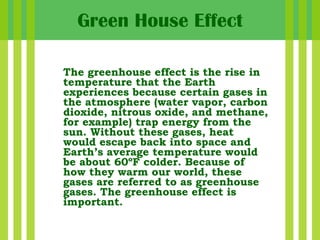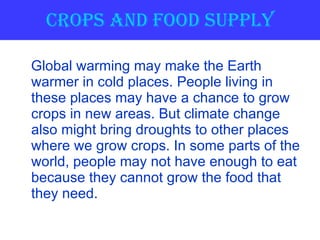Global warming
- 1. Global warming By SIMO
- 2. What is Global Warming Global warming refers to an average increase in the Earth's temperature, which in turn causes changes in climate. A warmer Earth may lead to changes in rainfall patterns, a rise in sea level, and a wide range of impacts on plants, wildlife, and humans. The earth’s temperature rises about 1 0 F in 100 years.
- 3. The greenhouse effect is the rise in temperature that the Earth experiences because certain gases in the atmosphere (water vapor, carbon dioxide, nitrous oxide, and methane, for example) trap energy from the sun. Without these gases, heat would escape back into space and Earth’s average temperature would be about 60ºF colder. Because of how they warm our world, these gases are referred to as greenhouse gases. The greenhouse effect is important. Green House Effect
- 5. Warm temperature may cause heat stress for humans. The warm temperature might produce air pollution, affect food changes and water supplies, which might affect human health indirectly. H U M A N H E A L T H
- 6. Ecological system Climate change may alter the world's habitats and ecosystems – all living things are included in and rely on these places. Many of these places depend on a delicate balance of rainfall, temperature, and soil type. A rapid change in climate could upset this balance and seriously endanger many living things because plant and animals may not be able to react quickly enough to survive.
- 7. Sea Level rise Global warming may make the sea level become higher. Warmer weather makes glaciers melt. A glacier is a large sheet of ice that moves very, very slowly. Some melting glaciers add more water to the ocean. Warmer temperatures also make water expand. When water expands in the ocean, it takes up more space and the level of the sea rises. This will effect both natural systems and manmade structures along coastlines .
- 8. Crops and Food Supply Global warming may make the Earth warmer in cold places. People living in these places may have a chance to grow crops in new areas. But climate change also might bring droughts to other places where we grow crops. In some parts of the world, people may not have enough to eat because they cannot grow the food that they need.
- 9. Save Electricity Whenever we use electricity, we help put greenhouse gases into the air. By turning off lights, the television, and the computer when you are through with them, you can help a lot. Bike, Bus, and Walk You can save energy by sometimes taking the bus, riding a bike, or walking. Talk to Your Family and Friends Talk with your family and friends about climate change. Let them know what you've learned. Plant Trees Planting trees is fun and a great way to reduce greenhouse gases. Trees absorb carbon dioxide, a greenhouse gas, from the air. Recycle Recycle cans, bottles, plastic bags, and newspapers. When you recycle, you send less trash to the landfill and you help save natural resources, like trees, oil, and elements such as aluminum. When You Buy, Buy Cool Stuff There are lots of ways we can improve the environment. One of the ways to reduce the amount of greenhouse gases that we put into the air is to buy products that don't use as much energy. By conserving energy, we help reduce climate change and make the Earth a better place. Some products – like certain cars and stereos – are made specially to save energy. Ways To reduce Global Warning
- 10. Ways to reduce global warming Solar Energy Solar energy is a fancy way of saying "energy that comes from the sun." Solar energy can be used to heat homes, buildings, water, and to make electricity. Cars Cars are an important part of life for most people. But cars also cause pollution and release a lot of greenhouse gases into the air. Fortunately, there are some cars that are better for the environment. These cars can travel longer on a smaller amount of gasoline. They don't pollute as much, either. Using these kinds of cars can help reduce the amount of greenhouse gases in the air. Become a smart water user If we can reduce the uses of the water, we may also reduce global warming. We need electricity to produce water, to make electricity me have to burn coal and oil which produces the greenhouse gases.









